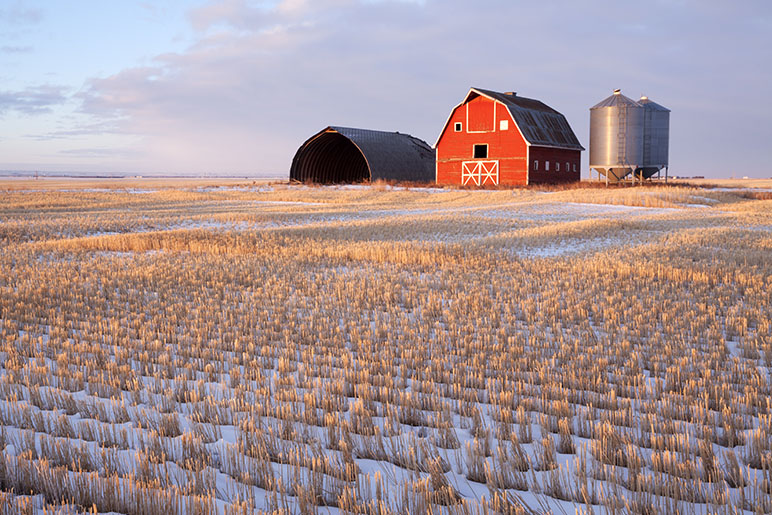
Feb. 20-26 is Grain Bin Safety Week! Grain bins are dangerous, and this week is the perfect opportunity to learn or review the dangers found on the farm working in and around grain and grain bins. Having a plan to respond in the event of an emergency on the farm is imperative.
Grain bin safety tips around your farm
Grain bins are common on many farms today, but these structures and the grain stored inside them can pose numerous threats and hazards.
Entrapment and suffocation are hazards when grain is loaded and unloaded from grain bins. Flowing grain is like quicksand, a person can become trapped in mere seconds. Farmers can also be trapped in grain when grain becomes "bridged,” or vertical piles collapse unexpectedly.
Please consider the following steps to prevent becoming entrapped in a grain bin:
Do not enter a grain bin unless absolutely necessary.
When entering a grain bin, shut off and secure all grain handling equipment. Wear a safety harness and have a lifeline.
Never enter a grain bin alone, have at least one other person serving as an observer from outside the grain bin.
Never allow children to play in or around grain bins, wagons or trailers.
Slipping and falling on the farm are among the most significant causes of injuries, especially around grain bins. In many cases, the number of injuries can be reduced by following these recommendations:
Ensure all ladders, stairs and walkways are clean and in good condition.
Keep extension cords, ropes or other items out of walkways and off ladders.
Avoid climbing ladders in wet and icy conditions.
Always have three points of contact when climbing.
Never carry anything when climbing. Hoist up tools and equipment with a rope after reaching the destination.
The use of electrical power around grain bins and farm complexes is a constant danger. Keeping all electrical components in good working order is vital to avoid electrical shock and fatal accidents. Please follow these steps to help stay safe:
According to National Electric Safety Code (NESC), power lines must be at least 18 feet above the highest point on any grain bin that portable augers fill.
Keep farm equipment at least 10 feet away from all power lines when moving and when loading and unloading grain bins.
Ensure all electrical equipment is properly grounded.
Use appropriate size fuses and circuit breakers.
How to stay safe on the farm
The risk of injury, crushing, entanglement or amputation is a threat farmers face every time they use equipment to fill and remove grain from grain bins. Follow these best practices to help keep everyone safe and free of injury:
Ensure all guards, covers and shields are properly installed and in place.
Use Lock-Out/Tag-Out when repairing and servicing all powered equipment.
Always use proper Personal Protective Equipment (PPE) in and around grain handling equipment and grain bins.
Know everyone’s location when operating in and around grain bins, especially children.
What to do before and after the unexpected
Farm accidents can still happen even in the safest conditions. It is essential to ensure that you have a plan to respond appropriately:
In the event of an accident or injury, the first step is always to call 911. There are additional steps that farmers can take to be prepared for an emergency:
Post emergency numbers for the farm, this should include local emergency resources, utilities and additional individuals and resources that may be needed in the event of an accident, fire or natural disaster.
Create a farm map identifying all barns and farm structures. Include the location of all critical areas such as shutoffs for electrical, water and natural gas/LP and hazardous materials storage areas – fuel, chemicals and combustible materials.
Determine a meeting location for all family members and farm employees to meet in the event of an emergency.
Contact your local Indiana Farm Bureau Insurance agent for assistance in developing a farm emergency plan. Indiana Farm Bureau Insurance has resources to help all sizes and types of farms prepare for the unexpected.
Inside Story is for educational and informational
purposes only. Inside Story is compiled from various sources, which may or may
not be affiliated with our family of companies, and may include the assistance
of artificial intelligence. While we strive to provide accurate and reliable
content, we make no warranties or guarantees about its completeness, accuracy,
or reliability, and are not responsible for the content of any third-party
sources or websites referenced herein. The inclusion of any content does not
establish a business relationship or constitute our endorsement, approval, or
recommendation of any third party. Testimonials and examples provided are for
illustrative purposes only and do not guarantee future or similar results or
outcomes, and may not consider individual circumstances, goals, needs, or
objectives. Inside Story does not provide legal, tax, or accounting advice. For
individual guidance, please consult a qualified professional in the appropriate
field.
Coverages
subject to policy terms, conditions, and exclusions. Subject to underwriting
review and approval.